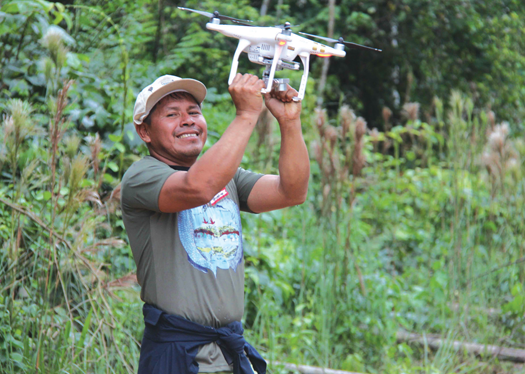
Local leader uses drone to spot illegal loggers and other intruders on community territory near Peru’s Sierra del Divisor National Park. (Photo by Barbara Fraser)
Saying they bring a “moral, ethical and spiritual dimension” to the defense of tropical forests, religious leaders from many faiths are joining with indigenous people and others to defend the Amazon rainforest and the people who dwell in it.
The Interfaith Rainforest Initiative was launched in Colombia in November and in Peru in December. It will also start up in Brazil, although organizers say a date has not been set. The initiative began in 2017 in Oslo, Norway, with a gathering of Christian, Jewish, Muslim, Hindu, Buddhist and Taoist religious leaders, indigenous leaders, and representatives of environmental and non-governmental organizations. The three Amazonian countries as well as Indonesia and the Democratic Republic of Congo were chosen as target nations because together they are home to about two-thirds of the world’s remaining tropical forests. The initiative is coordinated by the U.N. Environment Program and funded by the Norwegian government.
Methodist, Catholic, Presbyterian and Jewish leaders joined representatives of indigenous organizations in Lima this month to discuss issues affecting forests and forest dwellers. They released a statement containing nine commitments, which a commission will turn into an action plan in the coming months.
From Lima, capital of a country in which political decision-making is still highly centralized, people look at the Amazon and “see only forest,” says Lizardo Cauper, president of the Interethnic Association for the Development of the Peruvian Rainforest (Aidesep). Adds Cauper, whose group is Peru’s largest Amazonian indigenous organization: “But people and other beings live there.”
At a press conference on Dec. 5, the last day of the three-day meeting in Lima, Cauper and religious leaders emphasized the need to defend the rights of Amazonian indigenous peoples, particularly territorial rights. In their statement, the leaders pledged to raise their followers’ awareness about climate change, threats to the Amazon and respect for the rights of indigenous peoples. “The statement calls for a change in the way we look at the Amazon,” said Catholic Bishop Alfredo Vizcarra of Jaén, in the northern Peruvian Amazon.
The leaders decried “old and new forms of colonialism” that have historically produced “waves of invasion and destruction of forests by the state and various economic actors.”
“Prophetic voices” have been unable to stop the “indiscriminate concession of indigenous territories for the intensive exploitation of natural resources,” including logging, mining, oil and gas production, single-crop plantations, roads and dams, the leaders said. Those activities have been accompanied by trafficking in drugs, people and contraband, they observed.
Informed consent
The group committed to “learning from the wisdom and spirituality” of indigenous people, who they said often are “criminally prosecuted” for defending their rights. They called for the government to recognize indigenous territories and to guarantee indigenous people’s right to free, prior and informed consent about development-project decisions or other matters that could affect them.
The government must also discourage forced contact with semi-nomadic indigenous people who still live in isolation, they said. Forests in seven Amazonian countries are home to isolated groups, and the world’s largest concentration of them are found in lands along the border between Peru and Brazil.
At the press conference, the strongest comments came from Pedro Merino, a Presbyterian minister who heads the Evangelical Council of Peru. He linked economic activities that destroy the forest and the country’s corruption, and called for a binding prior-consultation process. In Peru, indigenous communities are consulted but cannot veto projects.
The statement from the interfaith group in Colombia raised many of the same issues, noting particularly the increase in deforestation in the past year, as areas that were once off limits because of violence have become accessible in the wake of the country’s peace process. In addition to calling on the country to “overcome violence,” the Colombian leaders said, “We also must promote a collective reconciliation with nature, with its rivers and its tropical forests.” Colombian courts, they noted, have recognized several rivers and the country’s Amazon basin as having legal rights.
Like their Peruvian counterparts, the Colombian leaders called on the government to respect and protect the rights of indigenous people, but also added those of African descent and small farmers living in tropical forests.
The religious leaders’ statements echo ideas espoused by Pope Francis in his letter to Catholics, “Laudato Si’, On Care for Our Common Home,” which was published in 2015, and in his comments to Amazonian indigenous people during his visit to Peru in January 2018. (See "Pope takes strong stand on protection of Amazon" —EcoAméricas, January 2018.) The pope has called a synod of bishops, a meeting of top Catholic Church leaders, to discuss Amazonian issues at the Vatican in October 2019.
Training and support
“Laudato Si’,” which addressed environmental issues and threats facing indigenous peoples, gave impetus to the formation of the Catholic Church’s Pan-Amazonian Church Network (Repam). The network has provided training and support to indigenous leaders in defense of their communities’ rights.
Movements such as the Interfaith Rainforest Initiative and Repam reflect a shift away from historical efforts by Catholic and evangelical missionaries to impose their religious beliefs, said Tuntiak Katán, a Shuar leader and vice president of the Coordinator of Indigenous Organizations of the Amazon River Basin (Coica), based in Quito, Ecuador.
Churches have much to learn from the worldview of indigenous people, who seek to use forests without destroying them, Katán said. Religious groups also have a responsibility to help strengthen indigenous organizations so they can defend their rights, he said.
Cauper cautioned that in seeking to support indigenous groups, religious leaders and environmentalists should not consider them mere caretakers of the forest. Many indigenous communities view themselves as the forest’s rightful owners, whether or not governments granted them that status. “We’re not ‘guardians,’” Cauper said. “We live there and have for generations, without bothering anyone.”
- Barbara Fraser
Information about the Interfaith Rainforest Initiative is available here